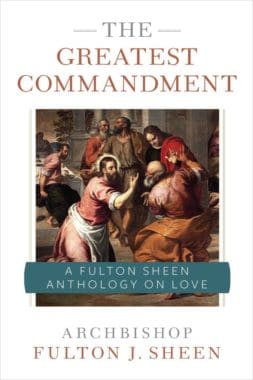The Love of God Is Justice!
How could God be good if He loved the bad equally with the good? The essence of love is not indifference to morality. ‘‘The way of the wicked is an abomination to the Lord: he that followeth justice is beloved by him” (Prov. 15:9).
“You have wearied the Lord with your words, and you said: Wherein have we wearied him? In that you say: Every one that doth evil, is good in the sight of the Lord, and such please him: or surely where is the God of judgment?” (Mal. 2:17)
The Love of God Is Freedom!
How could love be love if it were forced? By making man free, God made it possible for man to reject Divine Love. Man cannot be made to love God any more that he can be made to enjoy Bach’s classical music. The power of choice is not necessarily the choice of what is best. Hence, “If you love me, keep my commandments” (John 14:15).
The Love of God Is the First Cause of All Things!
Though God is the First Cause of all things, man is a secondary and instrumental cause, and not a mere robot. God wrote a wonderful drama and gave it to free men to play, and sometimes they make a botch of it. Not in time, but at the end of the world, all things will be restored according to Justice. “For because sentence is not speedily pronounced against the evil, the children of men commit evils without any fear. But though a sinner do evil a hundred times, and by patience be borne withal, I know from thence that it shall be well with them that fear God, who dread his face” (Eccles. 8:11–12).
The Love of God Is Eternal!
Therefore, I can never escape it. I can tend toward it freely and thus receive mercy, or I can freely rebel against it and in my frustration feel His Justice. “For we must all be manifested before the judgment seat of Christ, that every one may receive the proper things of the body, according as he hath done, whether it be good or evil” (2 Cor. 5:10).
The Love of God Is All-Powerful!
God would never have given men the power to choose evil if He could not draw goodness out of evil. The power to crucify Christ is mine, but the effect of that crucifixion, namely, the conquest of death by resurrection, is not mine, but God’s. “There is no wisdom, there is no prudence, there is no counsel against the Lord. The horse is prepared for the day of battle: but the Lord giveth safety” (Prov. 21:30–31).
The Love of God Is All-Seeing!
“Every man that passeth beyond his own bed, despising his own soul, and saying: Who seeth me? Darkness compasseth me about, and the walls cover me, and no man seeth me: whom do I fear? The Most High will not remember my sins. And he understandeth not that his eye seeth all things, for such a man’s fear driveth from him the fear of God, and the eyes of man fearing him: And he knoweth not that the eyes of the Lord are far brighter. . . . For all things were known to the Lord God, before they were created: so also after they were perfected he beholdeth all things” (Sir. 23:25–29).
The Love of God Is Strong!
Love is not “broadmindedness.” Capacity for indignation is sometimes a test of love, for there are enormities which true love must not only challenge, but resist. The sun which warms so gently can also wither; the rain which nourishes so tenderly can also rot. The change is not in the sun or the rain: it is in that upon which it falls. So the Love of God to the good is love; to the wicked, it seems wrath. “For we know that the judgment of God is, according to truth, against them that do such things…. Or despisest thou the riches of his goodness, and patience, and longsuffering? Knowest thou not that the benignity of God leadeth thee to penance? But according to thy hardness and impenitent heart, thou treasurest up to thyself wrath, against the day of wrath, and revelation of the just judgment of God” (Rom. 2:2, 4, 5).
The Love of God Is Merciful!
If we had never sinned, we never could have called Christ “Savior.” “But thou hast mercy upon all, because thou canst do all things, and overlookest the sins of men for the sake of repentance. For thou lovest all things that are, and hatest none of the things which thou hast made: for thou didst not appoint, or make any thing hating it” (Wisd. 11:24–25).
The Love of God Is the Cause of Our Love!
There are sparks of love in us because there was first the Flame in God. “Jesus answered, and said to her: Whosoever drinketh of this water, shall thirst again; but he that shall drink of the water that I will give him, shall not thirst for ever: But the water that I will give him, shall become in him a fountain of water, springing up into life everlasting” (John 4:13–14).
The Love of God Rules the Universe
Because all things in the world, from atoms to angels, were made by Love, it follows that the whole universe seeks and moves toward its own perfection and its own good. Acorns tend to become good oaks; two atoms of hydrogen and one atom of oxygen united by an electrical spark tend to become water.
Inasmuch as all things have a natural inclination toward the perfection befitting their nature, they tend in some way to become like God. Scientists only discover the laws of nature; they do not invent them.
The chemical and biological laws which govern animals are all participations in the Eternal Reason and Love of God. They act for a purpose, that is, according to reason because Eternal Reason created them; they seek their own good because Eternal Goodness or Divine Love called them into being.
The Love of God Made a Moral Universe!
But Divine Love acted differently when He created man. Water must seek its own level, but man ought to be good. A stone cannot choose to fly upward when released from my hand, but a man can choose to disobey the law of his nature. In other words, lower nature is determined, and therefore amoral; man is free, and therefore moral.
God compels the stone to obey the law of gravitation, but He does not compel us to be good. How could we really love if we were forced?
Is it not the possibility of a No that gives so much charm to our Yes? God, therefore, gave us the power to seek deliberately a goal and purpose other than His Perfect Love, in order that there might be meaning in our allegiance and love when we freely choose to give it. To man alone on this earth did God communicate some of His Freedom.
And if it be asked: “If God knew that I would rebel against His love and be a sinner, why did He make me?” The answer is: God did not make you as a sinner. You made yourself a sinner. In that sense, you are your own creator.
The possibility, not the necessity, of moral evil, of wars and social injustices which follow them, is the price we have to pay for the greatest good we possess—the gift of freedom. God could, of course, at any moment stop a war, but only at a terrible cost—the destruction of human freedom.
There are only two things that could possibly remove evil and suffering from the world: either the conformity of human wills to the will of God, or God becoming a dictator and destroying all human wills.
Why is it that men, who by forgetting the Love of God turn the universe into a house of mass suicide, never think of blaming themselves, but immediately put God on the judgment seat, and question His Love and Goodness?
We all have a share in the evils of the world, and it ill behooves us to ignore our faults and become critics of God. It is we who are in the prisoners’ dock in a world crisis like this. Instead of questioning the God of Love, we ought to be throwing ourselves on the Mercy of His Judgment.
+
This article is adapted from a chapter in The Greatest Commandment by Archbishop Fulton J. Sheen which is available from Sophia Institute Press.
Art for this post: Cover and featured image used with permission.





